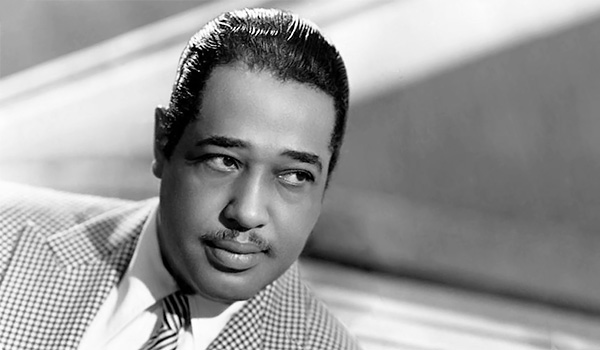In Celebration of the Human Voice - The Essential Musical Instrument
Home | Doo Wop | Barbershop | World | Contemporary | Christian | Vocal Jazz | Choral | Christmas | Instructional | Arrangements
Classical | Opera | Musicals | Personality | Young Singers | Disney | Videos | Songs | The Artists

Duke Ellington Biography

Click Here for Sheet Music and Songbook Vocal Arrangements
Edward Kennedy 'Duke' Ellington was born on April the 29th 1899 in Washington, D.C. The nickname 'Duke' was given to Ellington by a childhood friend, who noticed his impeccable taste in everything and that he carried himself with a sophisticated air at all times. Both his parents played the piano and Ellington himself first began lessons at the age of 7. At this time however, his talent for drawing and painting was apparently stronger than that for music. He attended the Armstrong Manual Training School, where he studied commercial art. During some time in Philadelphia he looked up Harvey Brooks, from who he learnt some piano tricks. This prompted Ellington to start learning again and he also began doing small gigs at local clubs and cafes. Three months before his graduation Ellington dropped out of school, so as to concentrate on a career in music. Eliington's first band, The Duke Serenaders, later called 'The Washingtonians', was formed in 1917. They played at different dance halls and lodges for $5.00 a night between them. However, finding a more lucrative part of the business in contracting bands out to these places, Ellington assembled a number of bands and was soon supplying 'a band for every occasion'. In 1918, he married his childhood sweetheart, Edna Thompson and in 1919 his son Mercer was born. Mercer would in the future join the band as a trumpeter and road manager. 1923 saw the band move to New York, where they played at various clubs. It was 1927 that gave the band their big break, when the prestigious Cotton Club offered Ellington and his band the job as house band. They became well known nationally, as the Cotton Club regularly broadcasted via radio. This new environment proved to be very productive for Ellington to develop his skills as a composer. He wrote music in an array of different styles for theatre acts, as well as continuing to write for the band. The band also broadened out to playing in Broadway musicals, the first being 'Show Girl' in 1929 and then later, in many films, including Murder at the Vanities and A Day at the Races. In 1931 Ellington left the Cotton Club as a well known celebrity and continued recording for different record companies and touring with his band in the USA and Europe. Even though his sidemen sometimes changed, Ellington adapted to these and his experimenting with his music helped him to find new outlets. Some newer outlets after 1956 included a satirical suite for the Shakespeare Festival in Stratford and his 'Sacred Concerts'. Duke Ellington died May 24th 1974, from cancer of both lungs, complicated by pneumonia. After his death his name was remembered through different schools, art centres and scholarships being named in his honour. Even the pop hit 'Sir Duke' by Stevie Wonder was done as a tribute to Ellington. Although many remember Ellington's earlier works from the 1940s, he continued to be a musical experimenter and he excelled as a composer, pianist and band leader throughout his career. His music and life still continues to affect people today, with a large sculpture memorial being dedicated to him over 20 years after his death. Awards Media Articles
Duke Ellington VideosCaravanA jazz classic in a barn burner Afro-Cuban setting, provides an exciting and energetic closer to a set, or even a full show. Fun and rewarding for your group to perform, there are opportunities for multiple solos, both vocal and instrumental. |
Select a Category |
Want to Sing? - Find a Chorus Near You
List of Choruses by State | List of Choruses by City

